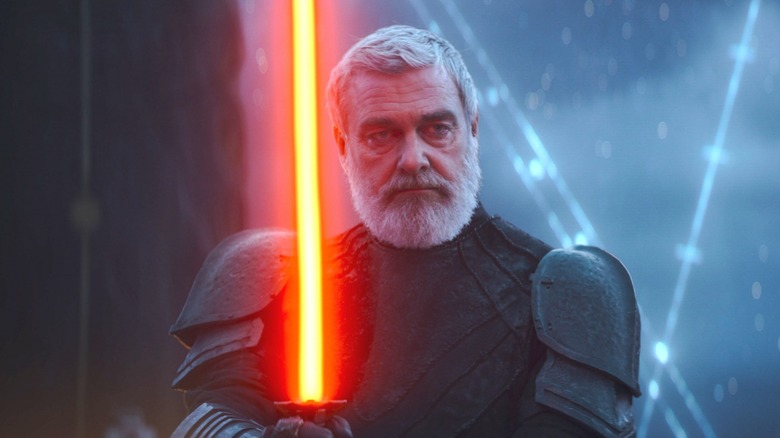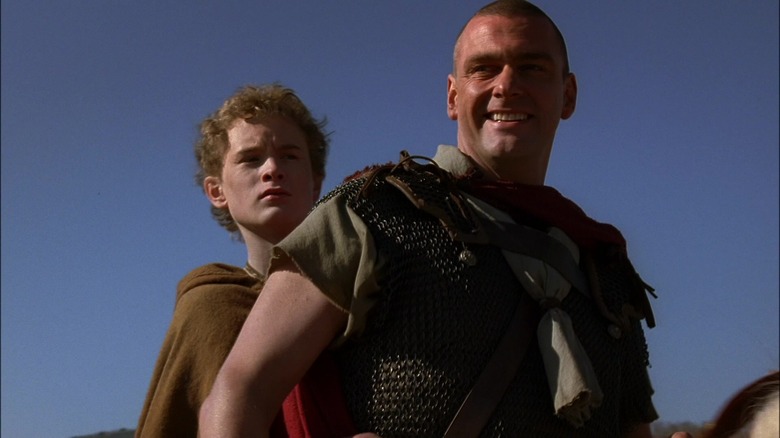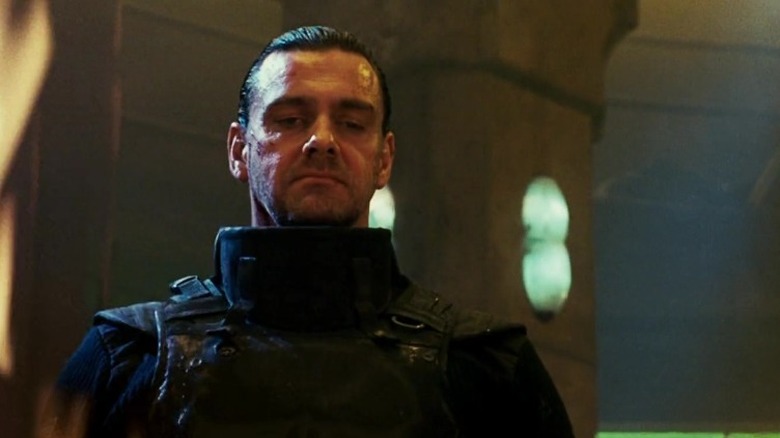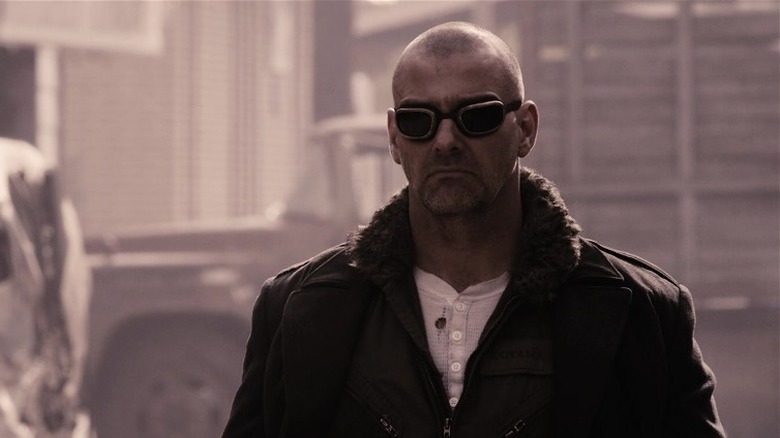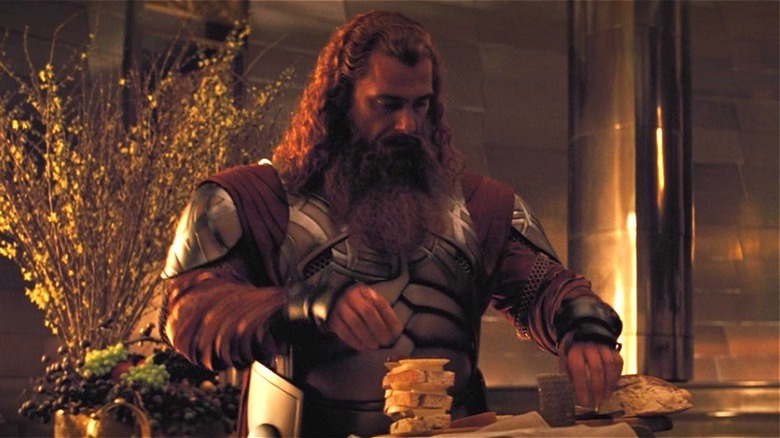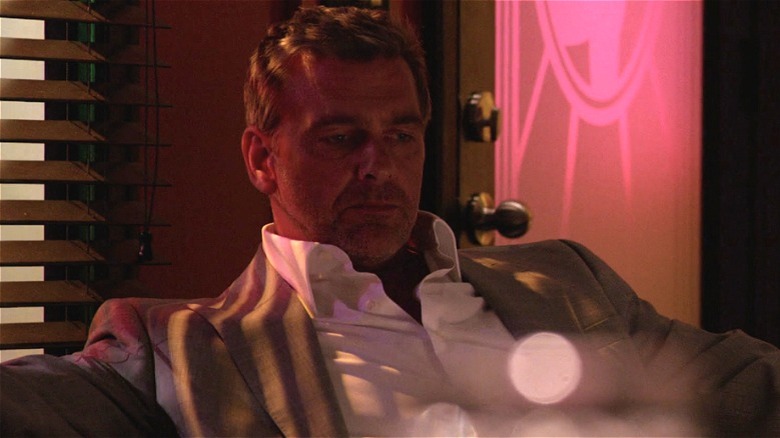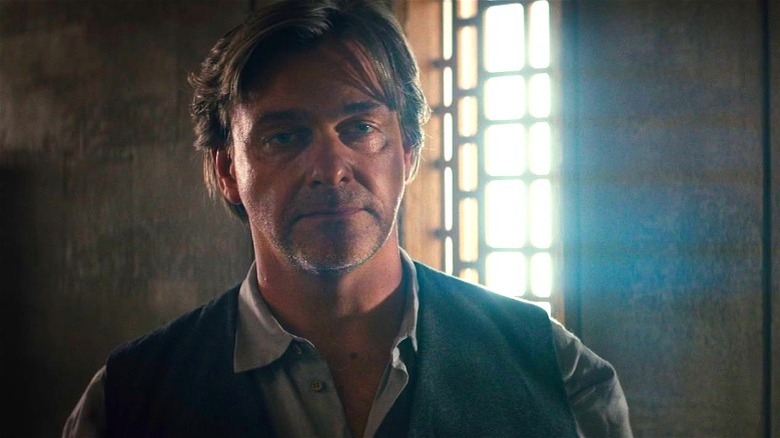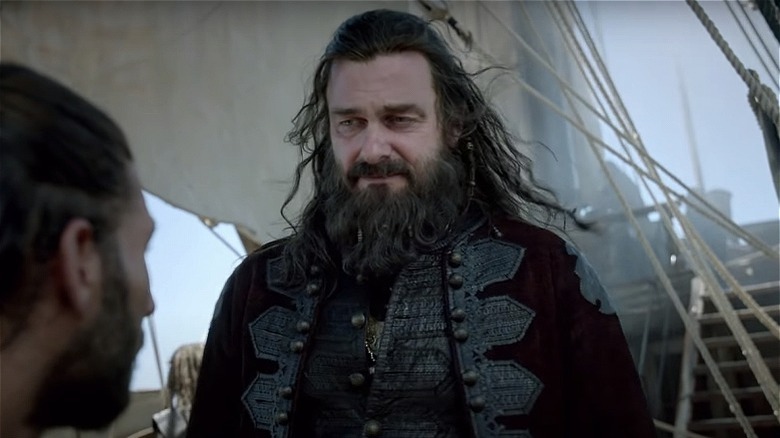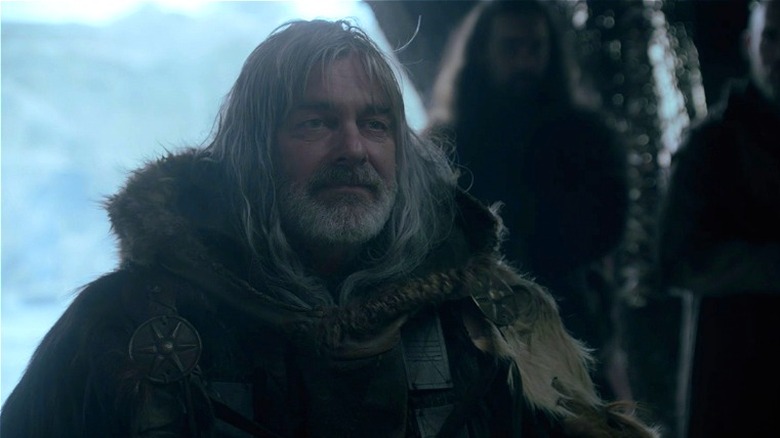Why Baylan Skoll From Ahsoka Looks So Familiar
The feat of bringing Ahsoka Tano (Rosario Dawson) to live action is no small thing. After years of watching her develop from a plucky padawan in "The Clone Wars" to a force to be reckoned with in "Rebels," audiences have been waiting with anticipation to see what happened after the conclusion of the best Star Wars series. Ahsoka will return in her live-action series, with the help of old friends Hera (Mary Elizabeth Winstead), Sabine (Natasha Liu Bordizzo), and even Chopper.
But as the "Ahsoka" trailer details, the fun doesn't stop there. In addition to the return of nefarious and intelligent Grand Admiral Thrawn (Lars Mikkelsen), Ahsoka will also be tangling with the villainous Baylan Skoll. Played by the incomparable Ray Stevenson, this is not the first time the accomplished actor has tangled with Star Wars — or Sabine Wren, for that matter. Stevenson voiced Gar Saxon in the animated series, a Mandalorian always on the wrong side of history.
Though we don't know much about Baylan Skoll's plans in the upcoming series, we can expect that Stevenson will bring the magnetic presence he has brought to so many roles before.
He was a brute with a heart of gold in Rome
Impressive and innovative television series being canceled far too soon is sadly not a new trend. Before gems like "Carnival Row" and "Warrior Nun" got the ax, there was "Rome." The costume drama preceded well-known series of the like, depicting the infamous time in Roman history when Caesar (Ciarán Hinds) reigned. Following the exploits of Roman soldier Vorenus (Kevin McKidd), Ray Stevenson was a shining light as his best friend, Titus Pullo. The impulsive Pullo goes headfirst into battle and is sentenced to death just in the first episode, but also has moments of tenderness throughout. As Stevenson tells it, audiences could have seen Pullo's full life, if only the series had lasted that long.
"Bruno [Heller] once did outline a story that he was going to start the whole series with," Stevenson told Den of Geek. "An 88-year-old Pullo going down to the riverside by Vorenus' tomb, or sarcophagus, pouring wine on it, taking a sword out while sitting there on the banks, looking at the glistening river, and committing suicide. And as he has his face hit the sand on the banks, a fish jumped out of the water, and the silver light on the fish caught the sword, which brought us right into that first battle with Lucius Vorenus and [Titus Pullo] where he breaks ranks." Stevenson complimented Heller's vision, even though we will never get to see the true end to "Rome."
He was a top-tier Frank Castle in Punisher: War Zone
"Punisher: War Zone" may not be winning any prestige awards, but it would be a crime not to give credit where credit is due. In the 2008 film, Ray Stevenson plays the widower out for revenge in a hail of bullets. Though Jon Bernthal is the recent obvious choice to reprise Frank Castle, Stevenson appears in one of the most comic-accurate portrayals of The Punisher. Helmed by Lexi Alexander, "Punisher: War Zone" was the first time a female director took on a Marvel character, and she stayed quite close to the source material. Pulling scenes and dialogue straight from comic panels, there has never been a comic book movie quite like this one. The film violence was incredibly in line with the source, and you can't deny Stevenson's sturdy stature was almost an exact replica of Frank.
Sure, Dominic West's Jigsaw was camp at its most outrageous, and we can never forget the parkour gang member who gets blown up with a rocket launcher. But when it comes down to it, Stevenson is one of the few actors who can pull off Frank effortlessly. At its heart, "Punisher: War Zone" was a love letter to the ridiculous nature of comics, and it did the character of Frank Castle right. Had the Marvel film not bombed at the box office, we may have seen the actor play the vigilante for many years.
He was a realistic villain in The Book of Eli
With post-apocalyptic films and television series on the rise, "The Book of Eli" is one worth revisiting. Zombies or viruses do not end the world in this film. Instead, it is the all too real possibility of a nuclear war turning the world into a wasteland. The film focuses on survival, as well as an intricately woven narrative about power and those who wield it. Eli (Denzel Washington) has the only known copy of The Bible, and his purpose is to follow his path and get where he's going. At the heart of his struggle is Carnegie's (Gary Oldman) pursuit of the book, knowing that weaponizing knowledge is a sure way to retain his hold on his community.
Ray Stevenson is an easy choice as Carnegie's enforcer, Redridge. Stevenson adds a slight twist to the fight over the book. He isn't necessarily interested in power, other than comfort in a desperate time. Instead, he is obsessed with Solara (Mila Kunis), who has aligned herself with Eli. This unsettling addition adds yet another flavor of realism to a post-apocalyptic film unlike any other. Though Stevenson could have been just another throwaway goon in the film, he adds depth to a character who meets his demise at the end of a machete. Mercifully for Solara, he never gets what he wants. And neither does Carnegie.
He played against type in Thor
Ray Stevenson's return to the Marvel universe came only three short years after "Punisher: War Zone." A far cry from Frank Castle's gruff and murderous exterior, Stevenson was cast as Volstagg in a little-known franchise called "Thor." Volstagg is part of the Warriors Three, a collection of Asgardians who Thor calls among his best friends. While The Warriors Three are defined generally by their support of Thor and thirst for battle, Volstagg has the added characteristic of a penchant for fine dining. This is what encourages him to join Thor on his ill-fated quest to storm Jotunheim, and ultimately fall into Loki's trap (for the first time).
Stevenson reprises his role any time Thor returns to Asgard in need of some otherworldly help. This good nature, unfortunately, leads to his demise, and he never sees the culmination of Thor's character at the end of "Thor: Ragnarok." Before things even get started, he dies along with Fandral (Zachary Levi) when Hela (Cate Blanchett) first storms Asgard. A fighter, lover of good eats, and brief guardian of the Bifrost, Volstagg was as good a champion as any. Stevenson steps easily into the role of the boisterous ally. Though his scenes are few and far between, Volstagg's good humor is something we don't see from Stevenson nearly enough. This light-hearted fare was a welcome change of pace before the actor returned to darker material.
He was Dexter's most romantic villain
As sure as the sun will rise, Showtime's "Dexter," always had a compelling Big Bad each season. Typically these villains are fellow serial killers that the titular murderer (Michael C. Hall) has to put down for the greater good. But in Season 7, Ray Stevenson's portrayal of Ukrainian mobster Isaak Sirko was something different, which attracted the actor to the role.
"I had worked with ['Dexter' producer and writer] Scott Buck on 'Rome.' He called me up at home — I live in Europe — and he starts to break it down, saying, 'All right, there's this character ... ' I knew the importance and the value, the prestige of 'Dexter,' nine episodes, lead-bad-guy sort of thing, that it wasn't 'villain of the week,' and also the quality of the people involved," Stevenson told Yahoo! TV.
After being told about Isaak Sirko's character progression, Stevenson was all in. Not only is he a cold-blooded mobster who faces off with Dexter, but he is also at the center of the season's emotional arc. Isaak intends to kill Dexter because he killed the mob boss's lover, Viktor (Enver Gjokaj). Throughout their interactions, Isaak and Dexter learn they have more in common than they may have realized. Dexter also struggles with his passion for his new love Hannah (Yvonne Strahovski), and he believes in their relationship. This sympathy allows Isaak to stay off Dexter's table and reunite with Viktor in death.
He was the world's worst father in the Divergent series
During the height of the YA dystopia craze, the "Divergent" series was one of the main favorites. Set in a dystopian-society Chicago where citizens are shoved into pigeon-holes, the series has an interesting concept that seemed to work — at least until it fell apart. And while it lacked the social commentary of "The Hunger Games," it still had compelling relationships and tragic backstories.
No backstory was as tragic as Tobias "Four" Eaton's (Theo James). Hailing from the Abnegation faction, Four signs himself up for Dauntless to escape his abusive father, Marcus (Ray Stevenson). Marcus is less of an outright villain and more of a reminder of the pitfalls and uselessness of forcing people into boxes. While a respected leader in the community, Marcus is also a brute with little remorse for his actions that have hurt the people closest to him. Stevenson was eager to tackle the subject matter. Like the Divergent characters in the series, the actor refused to be boiled down to just one thing.
"As an actor, I relish and delight in doing things that I'm not necessarily the demographic for," Stevenson told Collider about his casting. "This is a demographic that is touching the psyche of a certain age group, facing the real internal questions of people who are going through rites of passage into adulthood. It's earth-shaking stuff. So, I like bringing little subtle complexities to a character. It's all about the subtext."
He was one of the most notorious pirates in Black Sails
"Our Flag Means Death" may have introduced the world to Blackbeard's (Taika Waititi) sensitive side, but "Black Sails" was a series that demonstrated just how formidable the historical figure was. The prestige drama has the luxury of weaving the true-to-life people of the era, as well as those from literature, into the story. Captain James Flint (Toby Stephens) and John Silver (Luke Arnold) of "Treasure Island" fame are central to the story while they interact with real pirates such as Anne Bonny (Clara Paget). It was only natural that the series would introduce the notable pirate, Edward Teach (Ray Stevenson).
Stevenson does play the role of the cutthroat character we have come to know from history, but he also has an emotional arc that's examined. He returns to Nassau in hopes he can connect with his surrogate son, Vane (Zach McGowan). Though the two parted on bad terms, Blackbeard always views him as his kin up until Vane's death. This role was a dream for anyone, as Stevenson told Beyond the Velvet Rope.
"Well, it's like a gift of a part," Stevenson said, "but it's a minefield as well because you don't want to fall down the obvious traps and stuff like this." It was important to Stevenson to take parts of the famous pirate and mold him into the world of "Black Sails." And just as the well-known pirate was, Stevenson's portrayal has become iconic.
He was a source of mystery in Vikings
Ray Stevenson has had a long tenure of playing history-inspired characters, but usually they're not so mysterious as his character in "Vikings." The History Channel's saga revolving around real-life Scandinavian conquerors such as Ragnar Lothbrok (Travis Fimmel) lasted six seasons amid betrayal, battles, and a whole lot of blood eagles. Stevenson arrived just in time for the final season as a character no one is quite sure of. Introduced as a wanderer named Othere, his character is left up to a lot of interpretation.
As the remaining Lothbrok line makes their way for Iceland, they have to come to terms with the fact that the age of the Vikings may be over. Othere confesses to being a former Christian named Athelstan who killed a Viking and took his identity. This mix-and-match concept of religion is largely the point of Othere's arc. He is there to show the Vikings that there are many perspectives and ways of life. But is he entirely human? Some have questioned this extensively since the ending of "Vikings." Fans wonder if Othere is a god in the flesh put on the earth to steer the characters in the right direction. Others debate that he may just be a metaphor. Either way, Stevenson's part in the final season was instrumental, allowing the last of the Lothbroks to find a new haven in Iceland and a satisfying conclusion for fans.
